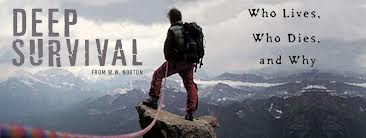In the world of literature that grapples with survival, few titles stand out as distinctly as “Deep Survival” by Laurence Gonzales. This compelling book is not merely a recount of harrowing experiences; it is an intricate examination of the human psyche when confronted with life-threatening situations. Gonzales dives deeply into the psychology of survival, intertwining gripping anecdotes with astute observations, making readers not only spectators but also participants in the cerebral journey he offers. As you peruse this review, expect a transformative shift in your perspective on survival, both in the wilderness and in the trials of everyday life.
The narrative begins with an exploration of the dichotomy between those who survive against all odds and those who do not. What truly sets the two groups apart? Gonzales meticulously dissects these differences, drawing upon real-life survival stories that illustrate the principles he aims to convey. He posits that it is often not just physical preparedness that makes the difference, but a critical mental framework. As readers, we are prompted to ponder: Are we adequately prepared for our own emergencies, both trivial and cosmic? Gonzalez’s insights into the human condition are as profound as they are provocative.
Curiosity is piqued as Gonzales presents the concept of “survival personality.” He suggests that certain psychological traits enhance one’s odds in survival scenarios. These traits include adaptability, decisiveness, and a certain level of emotional resilience. The author captivates the reader’s imagination, encouraging introspection and self-assessment. Could it be that our personality type significantly impacts our capacity to withstand crises? This question lingers as the narrative unfolds, making it nearly impossible to turn away.
The structure of “Deep Survival” is meticulously crafted, interweaving various themes such as the importance of intuition, the psychological effects of fear, and how environmental factors interact with our innate survival instincts. Gonzales artfully reveals the intricacies of how the brain operates under duress, engaging the reader in a dance of cerebral exploration. He brings to the forefront the role of the amygdala, the brain’s fear center, and illustrates how its interplay with the frontal cortex—the seat of rational thought—can dictate life or death decisions.
Through vivid storytelling, Gonzales recounts instances of survival from a plethora of contexts: from mountaineers trapped in blizzards to everyday people caught in situations that spiral into chaos. Each anecdote serves to illustrate the underlying principles he critiques; the appeal to pathos is powerful. A reader may find themselves holding their breath, utterly engrossed in these tales, as they serve both entertainment and a stark reality check. Gonzales’s talent for weaving high-stakes drama with educational insights creates a multifaceted reading experience that captures both the mind and the heart.
Moreover, the author’s style brims with enthusiasm and vigor, engaging readers with thought-provoking questions and scenarios. Gonzales encourages us to visualize ourselves within the narratives he weaves. Would we possess the courage to endure? What initial instincts would threaten to derail us? The proclivity toward self-examination is a hallmark of effective survival literature, and Gonzales leverages it masterfully throughout his work.
As he delves deeper into the science of survival, the author introduces the concept of “metacognition,” or the awareness and understanding of one’s own thought processes. This notion is particularly enthralling; it empowers readers to appreciate the duality of intuition versus analysis. Are we capturing enough of our thought frameworks to behave optimally under pressure? Gonzales encourages readers to embrace uncertainty, ultimately positing that acknowledging our ignorance in high-pressure situations may be one of the most potent tools in our survival arsenal.
The marvel of “Deep Survival” lies not only in its riveting narratives but also in its broader implications for everyday life. Each lesson gleaned from the wilderness can be extrapolated to our daily trials. Challenges abound in the modern world—be it relationship turmoil, work-related stress, or health crises. By shifting our perspective to view such struggles through a survival lens, Gonzales suggests we might uncover the hidden reservoirs of strength within us that prompt us to navigate life’s challenges with poise and perseverance.
In conclusion, “Deep Survival” is not simply a book about surviving physical peril; it beckons readers to shift their perceptions and explore their own capabilities in both tangible and intangible realms. The promises outlined within Gonzales’s prose are tantalizing: the book offers not just information, but a chance to interrogate your psyche and emerge more resilient. With a blend of captivating storytelling, scientific exploration, and philosophical inquiry, Gonzales invites readers to step outside the artificial confines of comfort and into the unpredictable world of survival. By undertaking this cerebral expedition through the intricacies of survival, one cannot help but end the journey with a freshly ignited curiosity about their own resilience. Dive into this mesmerizing chronicle, and let it transform your understanding of survival—one page at a time.
